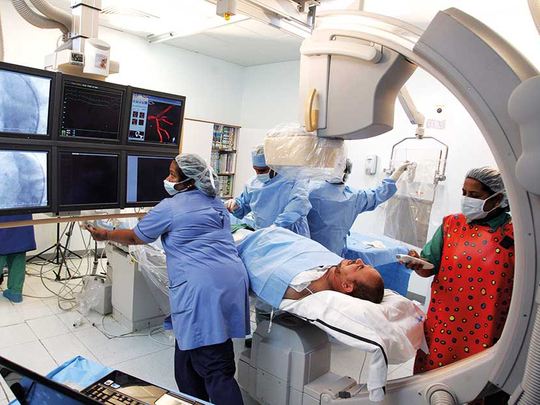
Dubai: Beginning January 2019, all private and public sector health care facilities in Dubai will be rated on their level of care and expertise, in accordance with the Dubai Health Facilities Performance Framework (DHFPF), officials said.
This rating system, to be implemented in five phases, will streamline health care and provide boost the burgeoning medical tourism sector. Currently, it’s in the fourth phase of implementation. So far, it has not been made clear whether DHA will use stars, diamonds or other forms of rating. The rating system may impact the prices of the health facility but this has not been made clear so far. It is likely to be come up during my the fifth and final phase of implementation.
Dr Marwan Al Mulla, CEO of DHA’s Health Regulation Department, told Gulf News: “We are in the fourth phase now, which involves implementation and automation of the rating system based on international principles of value-based care.”
Amal Al Mehrarizi, head of medical complaints at the department, said: “As of now, DHA is in the process of planning how the rating will roll out. Whether it will follow a five-star system, diamond rating, or numerical system will be decided in the fifth and final phase. It will also enable DHA to develop a reimbursement strategy in the long term, which will be linked to the health care facility’s rating.”
The new rating framework will include data from e-claims, Sheryan (DHA’s health regulation system), Salama (electronic patient file system for all DHA facilities) and a range of private health care providers. DHA will also engage with major private hospitals, day care surgery centres, selected polyclinics, Dubai Healthcare City (DHCC) and Ministry of Health & Prevention (MoHAP) facilities in Dubai, supporting them to help provide data.
Dr Al Mulla said “the Qeyas rating system which will come into effect at the beginning of next year is based on Key Performance Indicators (KPIs) that will cover all health care facilities. The KPIs are based on five pillars — patient safety, clinical quality, patient happiness, financial and operational indicators.”
Al Mulla further added: “Benchmarking and measuring the quality of care is fundamental to help build a robust health system where patient-centric care and safety is the cornerstone. We are working closely with the private sector to design a system that uses health data intelligently to help enhance health service delivery.”
Dr Mohammed Al Redha, director of DHA’s Project Management Office, Informatics and Smart Health Department, said, “The methodology will be data-driven and grounded in sound principles of data consistency, relevance, accuracy and integrity in order to drive crucial decision-making and strengthen the health sector in Dubai.”
The 5 Key Performance Indicators
■ Patient Safety Indicators
■ Clinical Quality Indicators
■ Patient Happiness Indicators (patient experience, wait time, etc)
■ Financial Indicators
■ Operational Indicators
Following the implementation of this system, DHA will be able to:
■ Improve quality across the health system in Dubai.
■ Provide consumers with information to help empower them to make better choices about health care providers.
■ Provide medical tourists with trustworthy, independently validated information about Dubai’s health care quality.
■ Develop a long-term reimbursement strategy, based on evidence of the quality of care provided.












